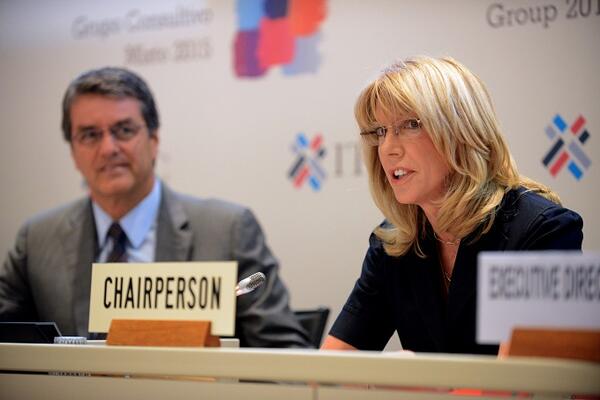
Chair's Report on the 49th Session of the Joint Advisory Group meeting (en)
Excellencies, distinguished participants, Ladies and Gentlemen,
It is now my privilege to present to you my Chair’s report on proceedings of the 49th session of the Joint Advisory Group.
I would like to begin by thanking delegations for their interventions, the WTO Director General, the UNCTAD Secretary General and of course the ITC Executive Director.
The heads of the WTO and UNCTAD set the stage for the constructive and substantive discussions that followed by pointing to ITC’s role in ensuring that the benefits of trade opening flow to developing countries, and especially to vulnerable communities such as women and youth.
These interventions clearly demonstrated the complementarity between the work of the WTO, UNCTAD and ITC. Cooperation on trade facilitation and non-tariff measures are just two examples of how these synergies operate in practice.
On ITC’s achievements in 2014 and its work in 2015 and beyond, the following points from today’s discussions are worth reiterating:
There is growing demand for ITC’s services. This was underscored today by several delegations, who described how ITC projects in their countries and regions had contributed to increased exports and job creation. They called for continued cooperation, in existing and new areas, to help developing and least developed countries boost growth and diversification by capitalizing on trade opportunities in goods and services.
ITC was urged to continue and indeed deepen its interventions specifically in the areas of trade facilitation, women's economic empowerment and regional economic integration as well as on its trade and market intelligence tools. Some specific requests were also made: LDCs, for help in working around standards and supply chains, and Latin American delegations called for additional ITC support to the region.
ITC’s record high delivery in 2014 of technical assistance, capacity building and market intelligence saw extra budgetary expenditures reach US$ 53 million, 35% higher than the year before. In addition ITC invested more than 60% of these resources in LDCs, landlocked developing countries, small island developing states, Sub-Saharan Africa, and post-conflict and vulnerable countries in line with its strategic and operational plans.
Today we heard the Executive Director’s pledge to bring this level to 70% by the next JAG.
We have heard how ITC consolidated the services and products it offers within six focus areas, and is taking concrete steps along a programmatic approach to better capture results.
A number of delegations spoke favourably of ITC’s focus on results, and the move to a more programmatic approach. Particular attention was drawn to ITC’s efforts to make strategic planning and impact reporting more consultative and inclusive and urged ITC to continue to improve its work in this area including in costing its interventions and better relating them to results.
Looking ahead, ITC’s work will build on the post-2015 development agenda and the outcomes of the WTO 10th Ministerial Conference.
Today’s rich discussions also attest to ITC’s ability to galvanise partnerships, including with the private sector, and its work to complement traditional aid for trade with investment for trade and other private sector contributions.
Many members voiced praise for ITC’s own institutional progress, in terms of reducing costs, achieving operational efficiencies, investing in staff skills, and increasing diversity in its workforce. Specific mention was made of ITC's new project portal and the improvements that this would lead to in terms of project management.
On the two external evaluations of ITC’s work, ITC management provided an update on the progress made towards implementing the recommended reforms. Out of 29 specific actions arising from the recommendations, 7 have already been implemented, and the rest are on track towards implementation.
Some highlights of this work include: the completion of a new Strategic Plan 2015-17; setting up a new ProgrammeDevelopment Task Force to finalize the organization of ITC’s work intoprogrammes under each of the six focus areas; a revamped project management system; a revised and improved Evaluation Policy, a new Resource Mobilization Strategy, and a Gender Mainstreaming Policy. Together, these and other policies will enable ITC to further improve its operational efficiency and results orientation.
Members commended the ITC for the work that it undertaken to respond to the evaluations and for its transparent approach to the process.
Last, but not least, we heard pledges of financial support from ITC’s members and funders. On behalf of the ITC I thank members for their commitment to ITC’s work in a spirit of true partnership.
Today’s discussions clearly showcased an organization that is doing more and doing better with the full confidence of its stakeholders. ITC is indeed, as my predecessor said, ‘fit for purpose’.
I therefore thank you, funders and beneficiaries for your continued trust, support and engagement with the organization.
I equally am grateful for your active participation in this session.
It has been my pleasure to serve as your Chair.



